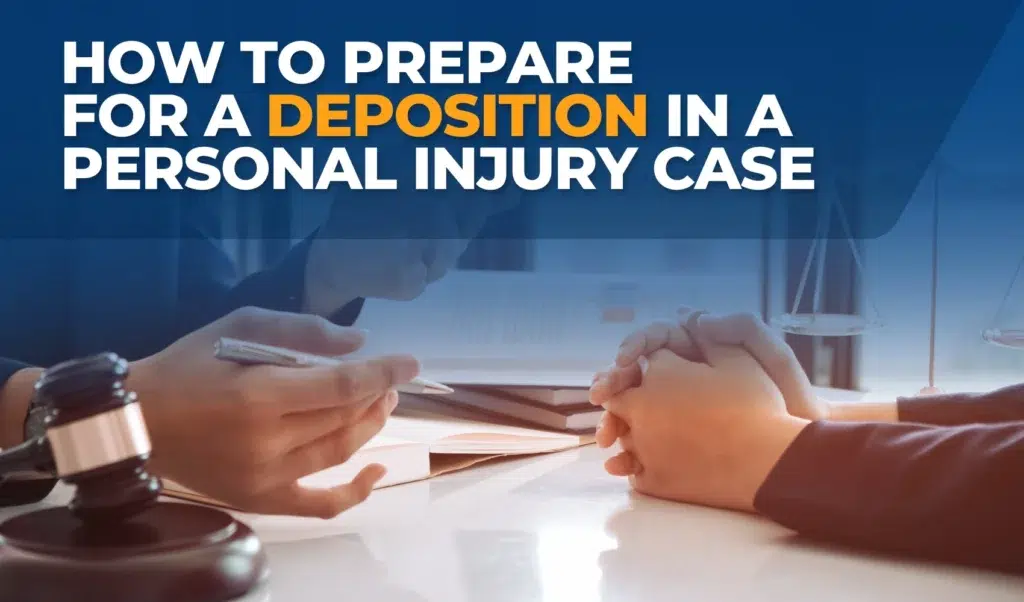Being asked to give a deposition in your personal injury case can feel intimidating, especially if it’s your first time. You may be worried about saying the wrong thing or unsure of what to expect. That’s completely understandable. A deposition is a formal part of the legal process where the other side’s attorney asks you questions about the accident, your injuries, and your background. What you say becomes part of the record and may be used later in court.
In this article, we’ll walk you through what happens before, during, and after a deposition — from how to answer questions clearly and truthfully to how to handle difficult moments with composure. Most importantly, you won’t be doing this alone. Your attorney will be by your side, helping protect your rights and guiding you every step of the way.
Before the Deposition Begins
Before your deposition officially starts, there are a few things you can expect to happen. First, you will be sworn in by the court reporter. This means you will take an oath to tell the truth, just like you would in a courtroom. It’s a formal part of the process, but nothing to be nervous about — it simply means your answers will carry the same weight as testimony given at trial.
At the beginning of the deposition, the defense attorney will usually explain some basic ground rules. You’ll be reminded to answer each question out loud, rather than nodding or using gestures, since a written transcript is being created. They may also ask if you’ve ever had your deposition taken before. If you have — whether it was for a personal injury case, a divorce, immigration, or any other legal matter — just answer truthfully.
In some cases, a videographer may also be present to record the deposition. If this happens, it’s important to sit still, maintain good posture, and be mindful of your facial expressions and body language. Jurors may one day watch this video, so staying calm, respectful, and composed can make a positive impression later on.
This part of the process may feel formal and unfamiliar, but remember — you are not expected to be perfect. You are simply expected to be honest and patient as you answer questions about your experience. Your attorney will be with you to guide you through the process and help protect your rights every step of the way.
Your Role in the Deposition
- You are not here to win your case.
- You are here to present yourself well — truthfully, calmly, and respectfully.
- Do not bring unnecessary items (e.g., cell phone, wallet, documents).
- You may be asked to turn them over. Best to leave them elsewhere.
- You may be asked to turn them over. Best to leave them elsewhere.
Answering Questions: Techniques and Tips
Tell the Truth. Always. Honesty is the single most important rule during a deposition. This is not the time to guess, exaggerate, or tell the defense attorney what you think they want to hear. Depositions are taken under oath, and giving false information — even unintentionally — can damage your credibility and hurt your case later on. It’s perfectly okay if the truth isn’t perfect. What matters most is that it’s accurate.
Pause Before Answering. When a question is asked, take a moment. Listen carefully and make sure you fully understand what’s being asked. Do not feel pressured to answer quickly. Pausing gives you time to think, and it also gives your attorney an opportunity to object if necessary.
Objections. If your attorney says, “Objection,” don’t panic. In most cases, you will still need to answer the question unless your attorney instructs you otherwise. Pay attention to how the objection is made. A longer or more detailed objection often signals that the question might be misleading, confusing, or unfair. Defense attorneys sometimes word questions in tricky ways, hoping you’ll agree to something you didn’t mean. Use this moment to slow down, stay calm, and answer truthfully — without changing your answer because of the objection.
Keep Your Answers Short. The defense attorney’s job is to gather information — not necessarily to help you explain your side of the story. Your job is to answer only the question being asked. If a question calls for a simple “yes” or “no,” then answer with “yes” or “no.” Do not add extra details, explanations, or opinions unless specifically asked to do so.
Do Not Guess. If you don’t know the answer to a question — say so. It is perfectly acceptable to respond with, “I don’t know,” “I don’t recall,” or “I would need to see that to be sure.” Trying to guess or estimate without certainty can hurt your credibility.
Ask for Clarification. If a question is unclear or confusing, it is completely appropriate to ask for it to be repeated or rephrased. A simple response like, “Can you please repeat or rephrase that?” helps ensure you understand what is being asked before you answer. Never feel rushed into answering something you don’t fully understand.
Be Calm, Respectful, and Courteous — Always. Depositions can sometimes feel tense, especially if the opposing attorney is aggressive or confrontational. No matter what happens, your best approach is to remain calm, respectful, and composed. Never argue or raise your voice. Address the attorney respectfully — using “sir,” “ma’am,” “the gentleman,” or “the lady” reflects very well on you. Jurors who may one day see or read your deposition will notice your tone, patience, and manners — and these details matter more than you might think.
Take Breaks When Needed. If you feel overwhelmed, anxious, or simply need a moment to collect your thoughts, you have every right to ask for a break. A deposition is not an interrogation. It’s a formal process, but you are allowed to step away briefly to calm down or gather yourself before continuing.
Don’t Be Disrespectful. It’s natural to feel frustrated or even upset during a deposition, especially if you feel like the questions are unfair. However, it’s extremely important to avoid sarcasm, eye-rolling, or any behavior that could come across as rude or disrespectful. Staying composed under pressure will reflect positively on you and your case.
Ask to See Documents. If you are asked about a document — like a medical record, statement, or report — you do not have to rely on memory alone. It is completely appropriate to say, “Can I see it before I answer?” Reviewing the document ensures accuracy and helps prevent mistakes.
Review Before the Deposition
- Refresh your memory on key topics:
- What happened in the collision
- Doctors and clinics visited
- Types and duration of treatment
- Pain, suffering, emotional distress
- Medical bills
- Scarring, bruising, long-term effects
- What happened in the collision
Background Questions You’ll Be Asked
- Education history
- Marriages and relationships
- Residence history
- Immigration history
- Employment history
- Prior collisions
- Prior injuries
- Pre-existing health conditions
- Criminal history
- Family details
Describing the Collision Scene
When answering questions about how the accident happened, it’s important to be aware that the defense attorney may intentionally use certain words to shape your answer. Sometimes, this is done subtly through the wording of their questions. For example, they may describe a side-impact crash as a “sideswipe” — even though those are very different types of collisions. Be careful not to simply accept their terminology if it doesn’t accurately describe what happened. Instead, use your own words and be precise in how you explain the events.
If you are asked to estimate distances, try to use clear and relatable comparisons. For instance, saying “about the length of a medium-sized sedan” may be easier for everyone to visualize than giving a measurement in feet or yards. However, always aim to be as specific and honest as possible.
The language you use matters a great deal. Small differences in phrasing can change the meaning of your answer. For example, saying “I was stopped” is very different from saying “I was coming to a stop.” The first means you were completely motionless, while the second suggests you were still moving. This is why it’s important to speak slowly, listen carefully, and make sure your words reflect exactly what you mean.
Finally, when it comes to describing what you saw, be confident. If you had a green light, say so without hesitation. A clear and firm statement like “I had a green light — one hundred percent” is far stronger than saying, “I think I had a green light” or “Maybe I had a green light.” Uncertain language like “I think,” “maybe,” or “I guess” can weaken your testimony. If you know what you saw, state it directly and confidently.
Police Reports and Scene Evidence
- The police were not there during the crash — they rely on what they’re told.
- If a report is unfavorable, discuss with your attorney beforehand how to address it.
- You can explain that the officer may have been misinformed or mistaken.
Your Behavior at the Scene
- Be mindful of how you describe yourself.
- If you were angry, explain calmly and sincerely why.
- Do not justify bad behavior — juries notice attitude.
- If you were angry, explain calmly and sincerely why.
- If you didn’t mention pain at the scene:
- That’s common. Adrenaline often masks pain.
- Discuss with your attorney how to explain this truthfully.
- That’s common. Adrenaline often masks pain.
Medical Treatment Questions
The defense will try to:
- Show you’re exaggerating:
- By pointing to prior injuries or conditions
- By emphasizing gaps in treatment
- By showing you didn’t understand or follow treatment
- By asking about medical bills or what procedures were done
- By pointing to prior injuries or conditions
- DO NOT badmouth your doctors.
- Suggest you and your doctors are trying to cheat the system:
- Remember: We can’t say the word ‘insurance’ at trial.
- We have to act as if the defendant personally pays everything.
- Suggest you and your doctors are trying to cheat the system:
Common Defense Questions:
During your deposition, the defense attorney may ask certain questions that are designed to raise doubts about your treatment choices. One common question is, “Who referred you to this doctor?” If you’re asked this, it’s very important not to say that your lawyer referred you — even if that’s true. Doing so may lead the defense to imply that your care was coordinated for legal reasons rather than medical ones. A better and truthful response would be something like, “I looked for doctors who treat car accident patients.” This shows that you took initiative to find appropriate care for your injuries, just like anyone would after a serious crash.
Another question you may face is, “Why didn’t you see your primary care doctor?” This is a tactic often used to suggest that your decision to seek treatment elsewhere was unusual or suspicious. But the reality is, primary care physicians are not trauma specialists. They typically handle routine health concerns like high blood pressure, annual checkups, or common illnesses — not injuries from sudden, high-impact accidents. Seeing a specialist after a car crash is no different than going to the right kind of doctor for any other specific injury. Think of it this way: if you broke your leg, you wouldn’t go to the dentist. The same logic applies here.
Conclusion
Preparing for a deposition may feel stressful, but with the right guidance and mindset, you can approach the process with confidence. Remember, your role isn’t to argue your case — it’s to tell the truth clearly, calmly, and respectfully. The way you present yourself matters, and being thoughtful in your answers helps protect the integrity of your testimony.
While the defense attorney may ask difficult or pointed questions, you are not alone in facing them. Your attorney will be with you throughout the deposition to safeguard your rights, address objections, and support you at every step. With preparation, patience, and professionalism, you can navigate your deposition in a way that strengthens your case and reinforces your credibility.





